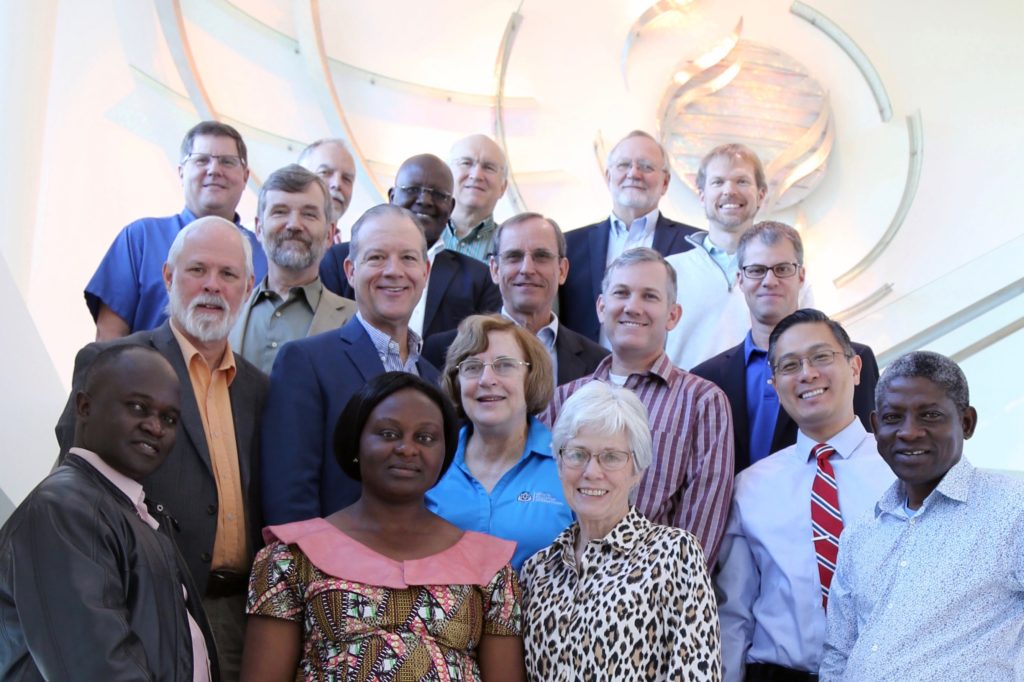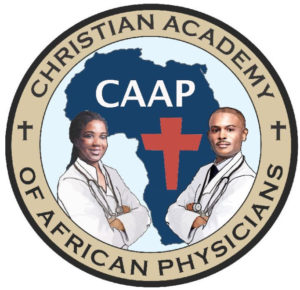
2019 CAAP Forum
The Mission of CAAP: CAAP supports programs that teach and mentor African physicians and primary care providers who empower the Body of Christ to continue the teaching and healing ministry of the Great Physician.
Why CAAP?
“Graduate medical education is an excellent means of building the capacity of health care systems in low and middle income countries (LMIC) and a growing way for physicians in high income countries to get involved in integral mission…”
(from: Merry SP, Dahlman B, Sawatsky A, Palmer D, Shannon KC, Thacher TD. Starting and resourcing family and internal medicine residency programs as integral mission. Christian Journal for Global Health, Nov 2016. 3(2): 151-159.)
The health care needs of the medically under-served populations in sub-Saharan Africa are vast. Here, church health systems still provide some 30 – 60% of the health services especially to rural populations with little or no outside assistance or government subsidy. In many countries, these church hospitals have long trained well-qualified nurses to run dispensaries and staff hospitals. Prior to 20 years ago, church hospital systems largely left the training of physicians to the Ministries of Health, most of which had not until recently caught the vision of a broadly well-trained, “pluripotent” Family Medicine specialists able to manage the full spectrum of internal medicine, pediatric, obstetrical, gynecologic, essential surgical, and psychiatric care while serving as hospital administrator and consultant to the community health program.
So why is post-graduate training of the otherwise broadly trained, internship-graduated, medical officer so important? While a medical officer might stay for a year or two, he or she will usually become frustrated with an inability to safely operate on trauma and essential surgical cases, to handle complex internal medicine or pediatric illnesses, to balance the demands of community health and acute care, and so usually moves back to the city to train in a narrow specialty ill suited for care of those most in need. Or, once trained in a sub-specialty, this physician who once had a vision for healing the wounds of those lacking access to medical care may take a job with a higher paying NGO or become part of the brain drain to the West.
Many countries now offer post-graduate courses but rarely have openings for more than 20% of the graduates from medical school of any given year. Without government sponsorship opportunities, most church facility based doctors do not have many opportunities for further training and therefore career advancement is stalled.
CAAP seeks to redress this imbalance by supporting the expansion of residency training opportunities for African Christian physicians who will seek to serve in under-served areas and live out the Gospel in Africa.
A Bit of History
Church hospitals in a few African countries began to train Family Physicians some 20 years ago. Two countries serve as excellent examples of the widespread interest in generalist specialty training in Family Medicine. In Nigeria alone, some 40 church hospitals have established Family Medicine residency programs. These programs offer 2 and 4 year post-graduate programmes based on the well-conceived West African College of Physicians curriculum (which is also being used at the new program at ELWA hospital in Liberia). Congo’s Université Protestante au Congo runs a 4 year programme which involves 2 years at UPC in Kinchasa, followed by practical training of the residents at eight locations across the country (number of residents in location in parentheses after the city: Kimpese (3), Vanga (1), Tshikaji (1), Bukavu (4), Nebobongo (1), Luyindu (2), Monkole (2), Goma (6). The UPC curriculum is structured around 25 modules, including 13 for FM and 12 for PHC. As of last word, 20 postgraduate students (residents) will take their final exam in June, 2018.
The mission to serve others is embedded in relationship – personal relationship and obedience to Christ, compassionate care of patients and the mentoring and discipling relationship between an educator and an engaged learner. Expat educators from well-resourced countries may be tempted to be involved in short-term missions and “medical camps” and may thereby provide some episodic assistance. But it is a long-term commitment to people and place that creates lasting change for good and for Christ’s Kingdom. Together healthcare workers and African missional physicians together with Christian physicians from beyond its shores must learn and serve together to address the huge medical and spiritual disparities of African which has 25% of the world’s healthcare needs yet only 3% of the world’s healthcare workers.
The vision to launch CAAP was born out of years of pre-conference discussions at the annual Global Missions Health Conference (GMHC) in Louisville, KY. and observations of the effectiveness of the PAACS residency programs at church hospitals across Africa. In November 2015, a large group of African and American physician academics gathered at the GMHC pre-conference to discuss graduate medical education as a means of integral mission – the the task of bringing the whole of life under the lordship of Jesus Christ, affirming (a la Lausanne) that there is no biblical dichotomy between evangelism and social responsibility. The focus of that conference was around how Western physicians can provide collegial support for their African colleagues to enhance church hospital residency programs already in existence and to aid in starting many dozens more programs across the continent.
The discussion of that 2015 pre-conference was written up as a conference report for the Christian Journal for Global Health which we would encourage particularly Western expats to read if considering involvement in CAAP. The abstract of that report is reprinted here: “Graduate medical education is an excellent means of building the capacity of health care systems in low and middle Income Countries (LMIC) and a growing way for physicians in the U.S to get involved in integral mission – the proclamation and demonstration of the Gospel. This white paper purposes to provide a “best practices” recommendations on family and internal medicine (“medical”) residency program development in majority world settings. An expert panel of residency educators convened in November 2015 at the Global Missions Health Conference (GMHC) in Louisville, Kentucky and through an iterative process identified themes that were then further defined and clarified by medical residency faculty unable to be present. Participants largely agreed that integration and cooperation with the country’s Ministry of Health (MOH) is essential for sustainable residency development. Recognition of family medicine as a specialty will enable graduates to succeed in the country’s physician job market and health systems leadership. Recognition by the national church of the unique needs of their mission hospitals’ educational programs to control their revenue in order to fund their programs’ growth and development exemplifies the common wisdom to provide authority and resources where responsibility for good outcomes is expected. Co-training of general surgeons and medical residents who can provide essential surgical call coverage may lead to on-going synergies. Teaching by medical and surgical sub-specialists is essential in medical residencies to provide the depth of instruction residents need to develop as excellent clinicians. Dependable scheduling of their specialty instruction allows residency program directors to assure inclusion of their content in the residency curriculum. In summary, participants agreed that teaching in medical residency programs in LMIC present excellent opportunities for national and expat Christian physician educators interested in integral mission.”
Brigades: The Bad Alternative To Medical Education Missions
Too many churches, medical schools and medical societies are involved in sending healthcare teams to medically under-resourced countries to set up bush clinics and pretend to provide effective, quality care. These medical and surgical teams may see hundreds of patients, from surrounding villages for 1-2 weeks, hand out donated pharmaceuticals often for chronic diseases that are thus treated without continuity, follow western protocols with minimal benefits that are inappropriate for that country and contradict the Ministry of Health treatment protocols, ignore the healthcare economics of the area and flood the market with free medication, eyeglasses and dental care, misdiagnose and maltreat tropical diseases, operate on many who truly do lack access but often with little post-operative care and usually without any involvement of local surgeons – in summary, do little to solve the healthcare disparities in a sustainable manner that builds healthcare capacity through medical and surgical education of national providers. Such behavior is misguided and highly inefficient at best, and at the core unethical seeking to make the visiting teams feel good rather than following the principles justice, beneficence, non-maleficence and autonomy in serving the medically underserved. If you, your church, your medical school, your medical or surgical society, or someone you know is thinking about one of these brigades, please download this resource questionnaire with extensive bibliography to challenge them to rethink the ethics of such a plan. Consider instead how you might encourage them to resource one of the hundreds of church hospitals and clinics who would benefit from their longitudinal relationship and resourcing.
